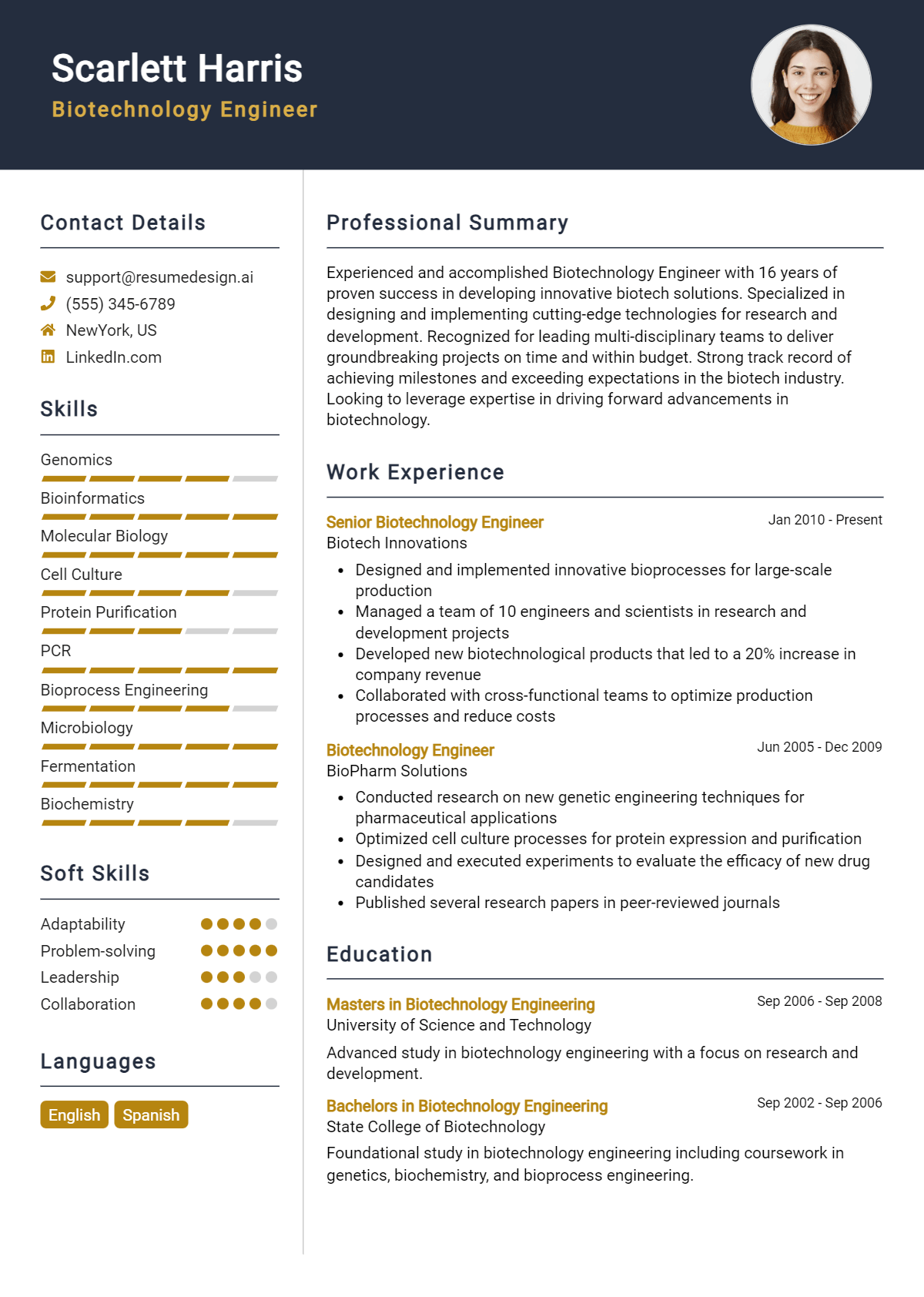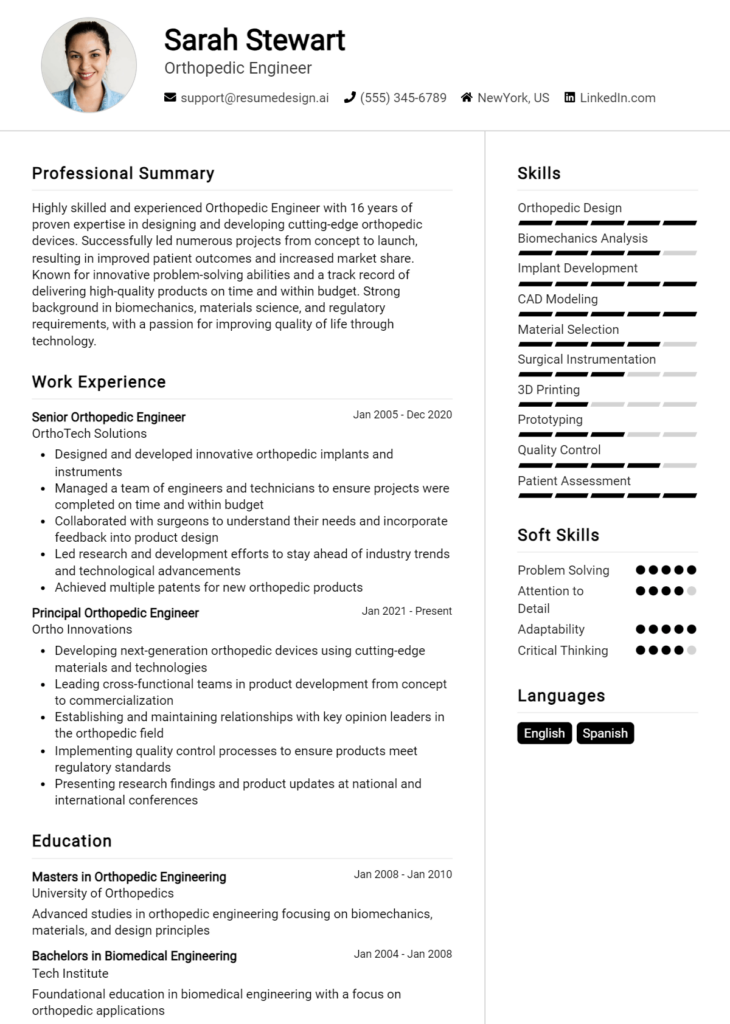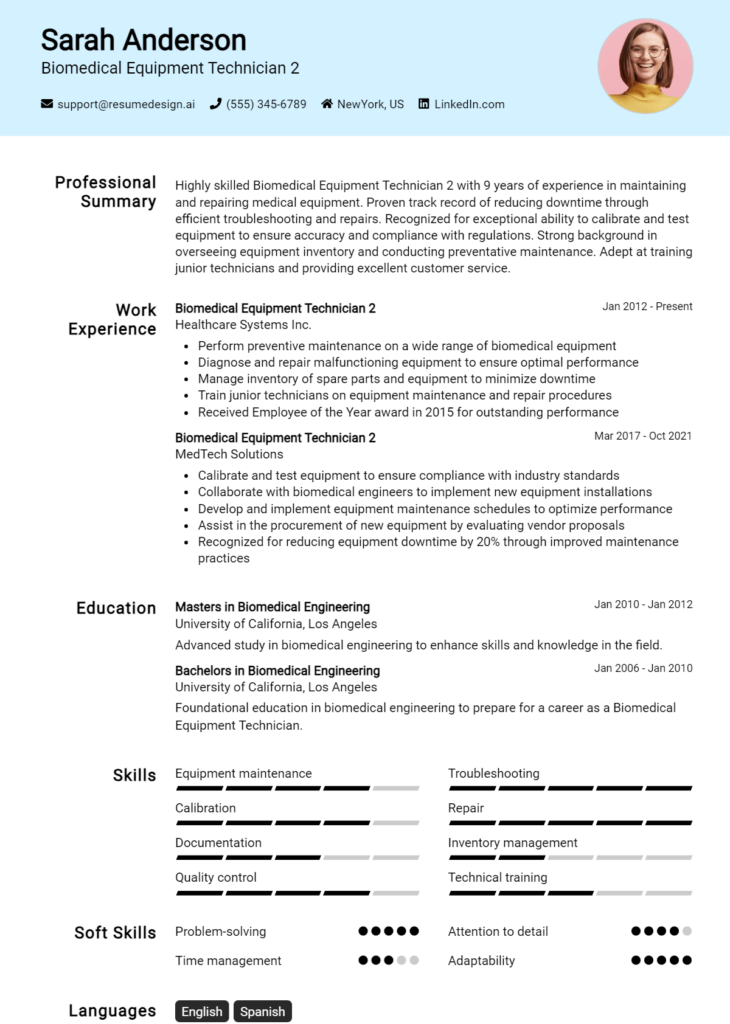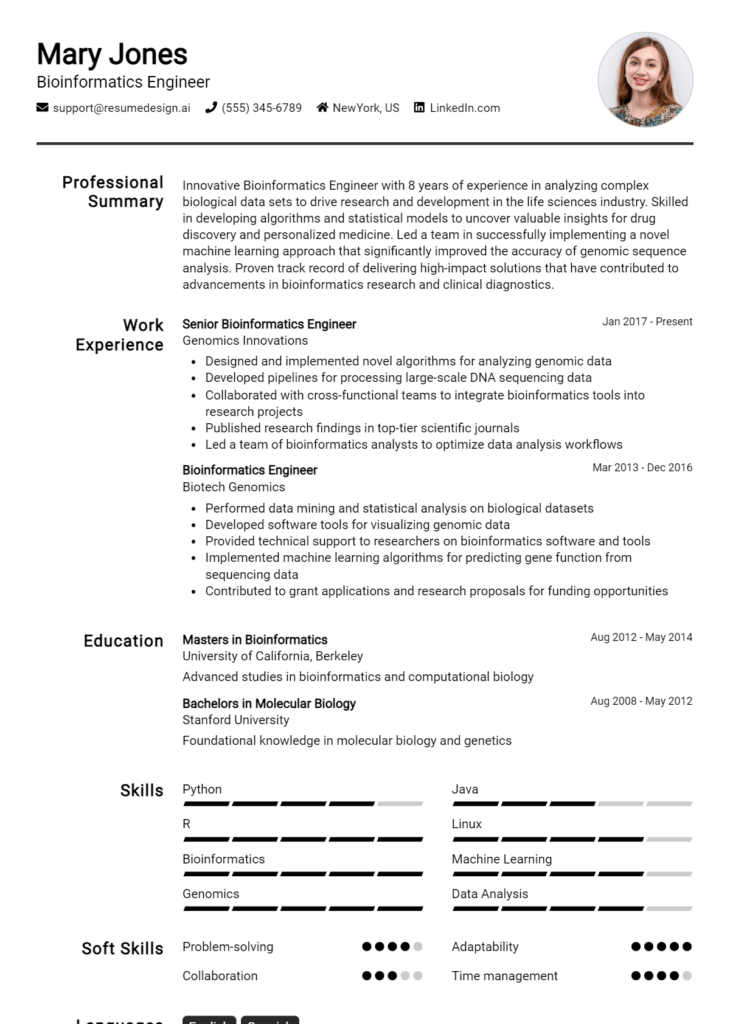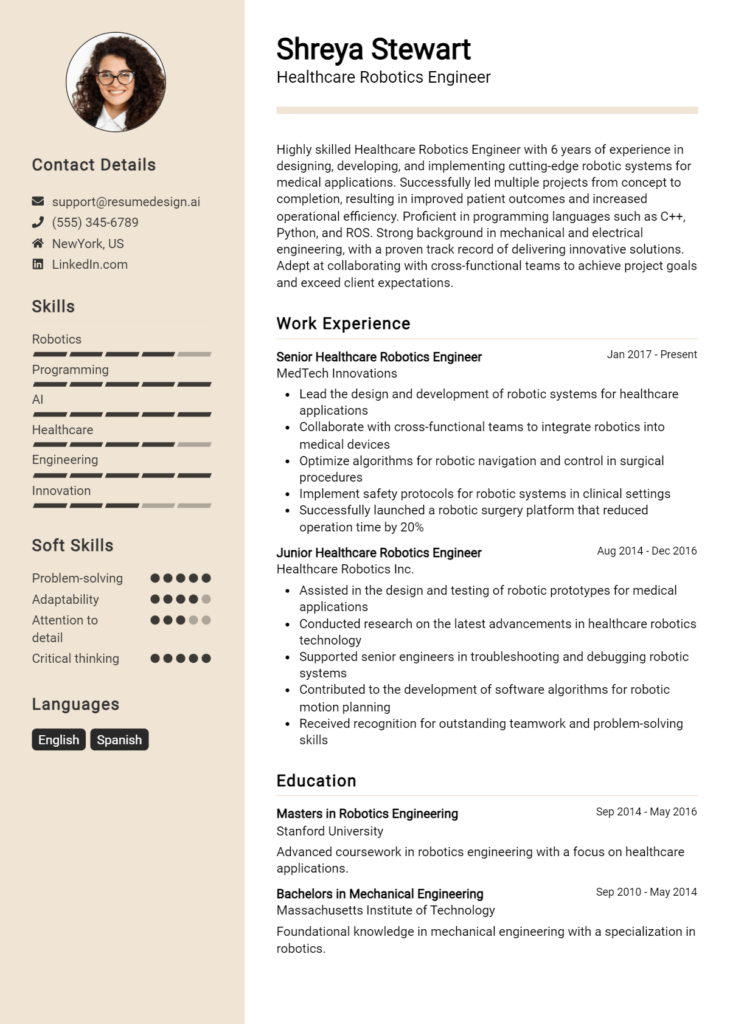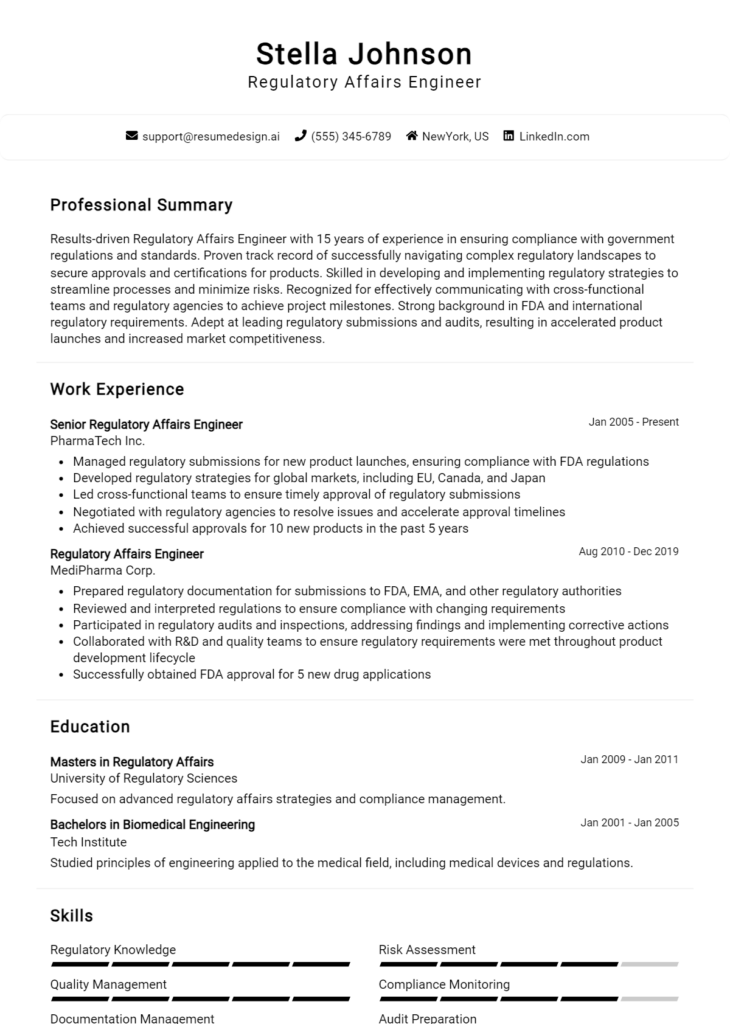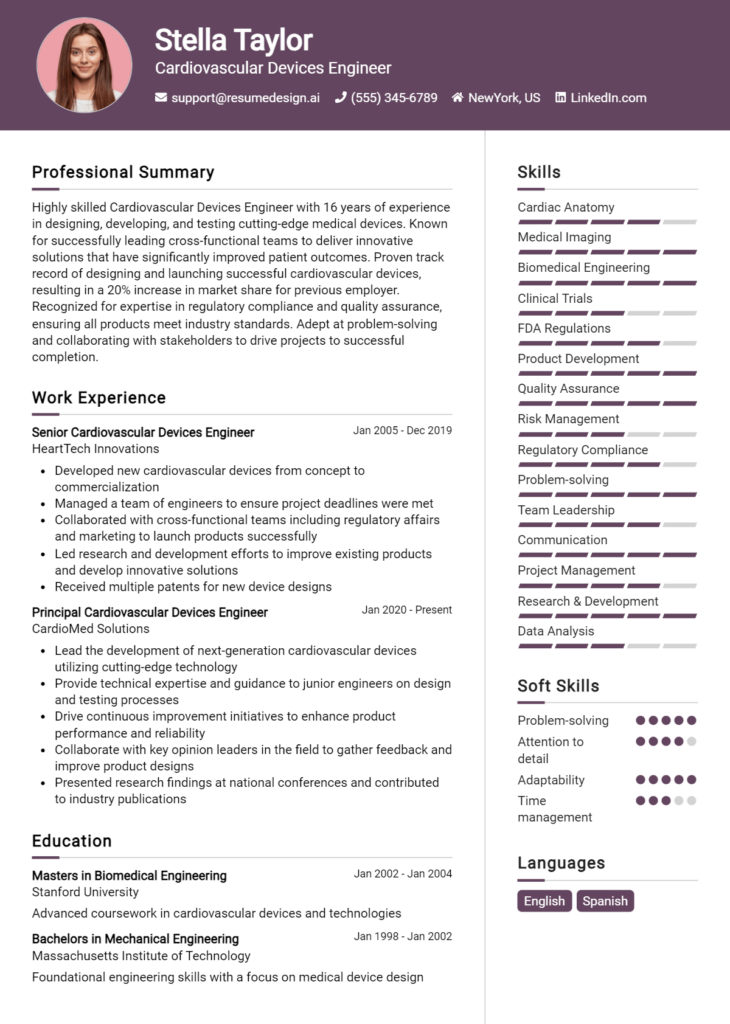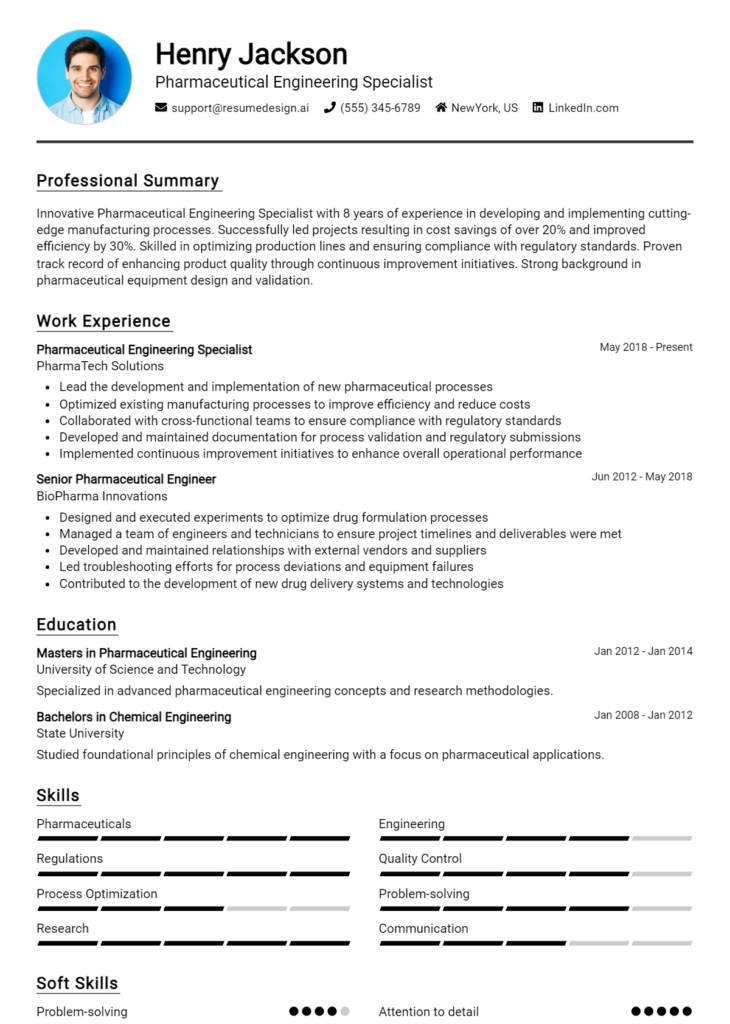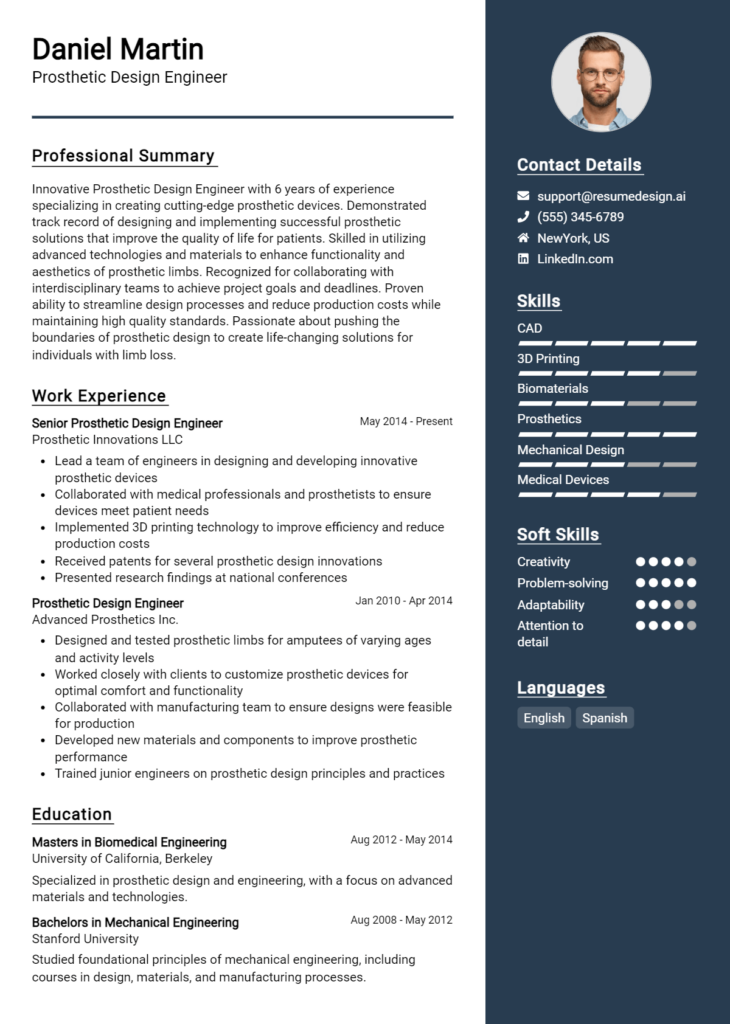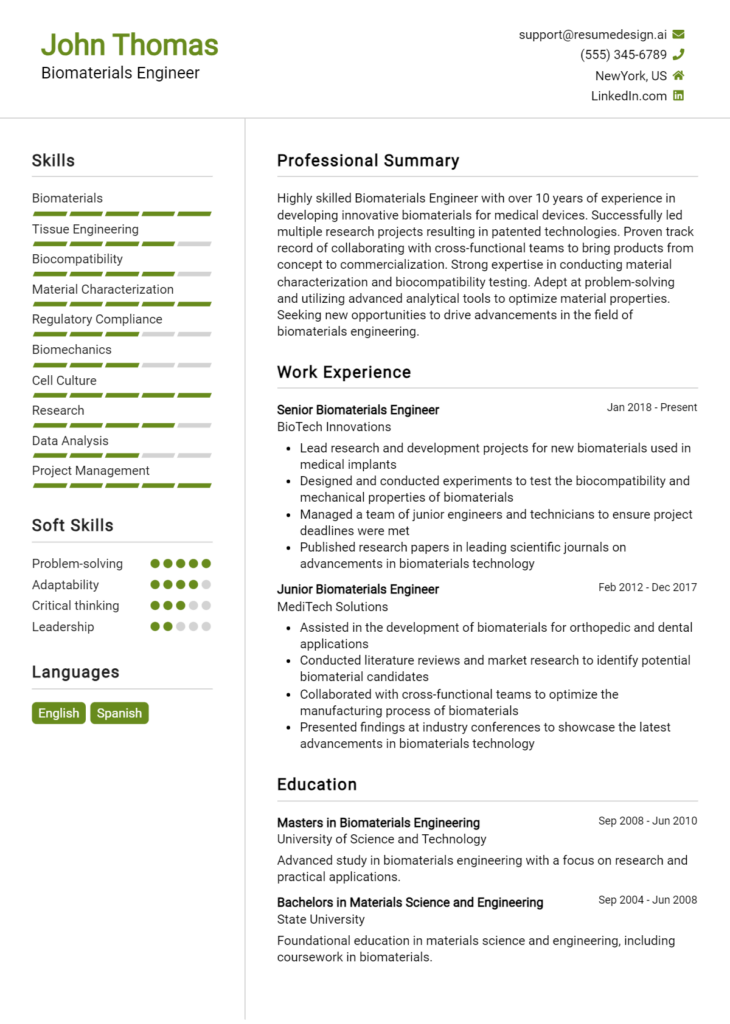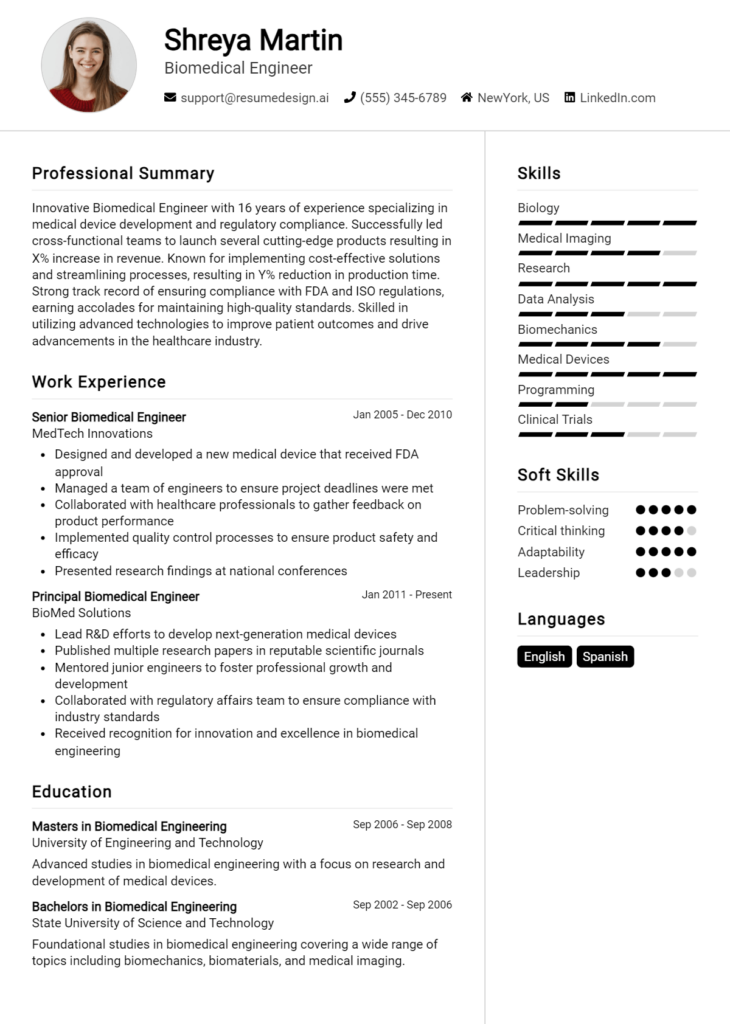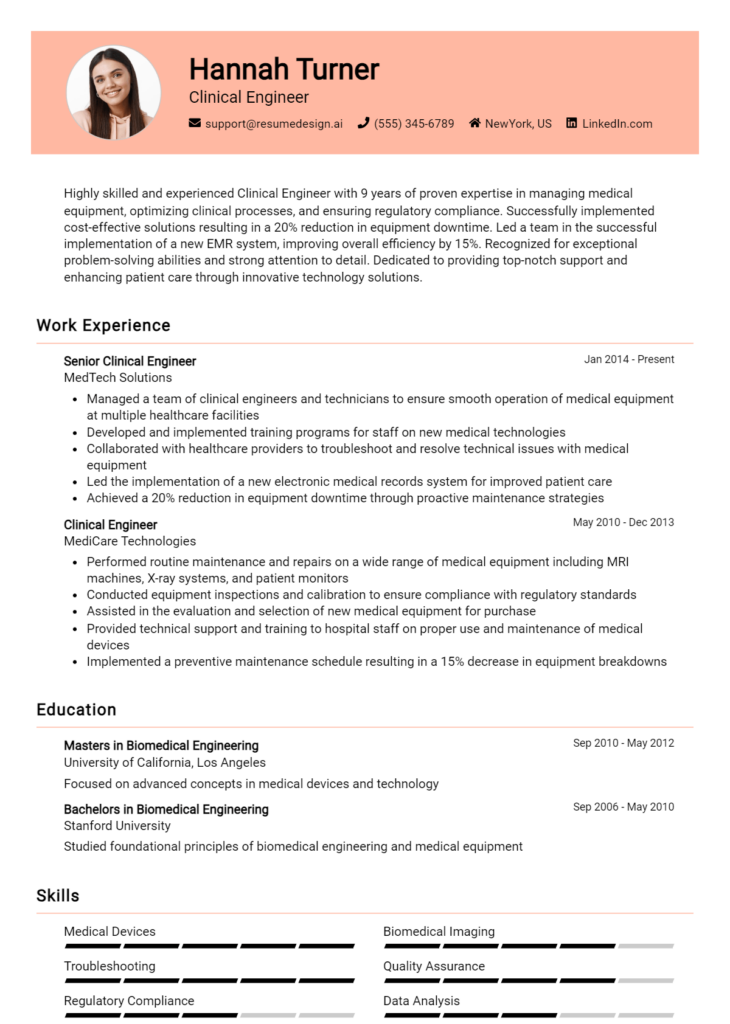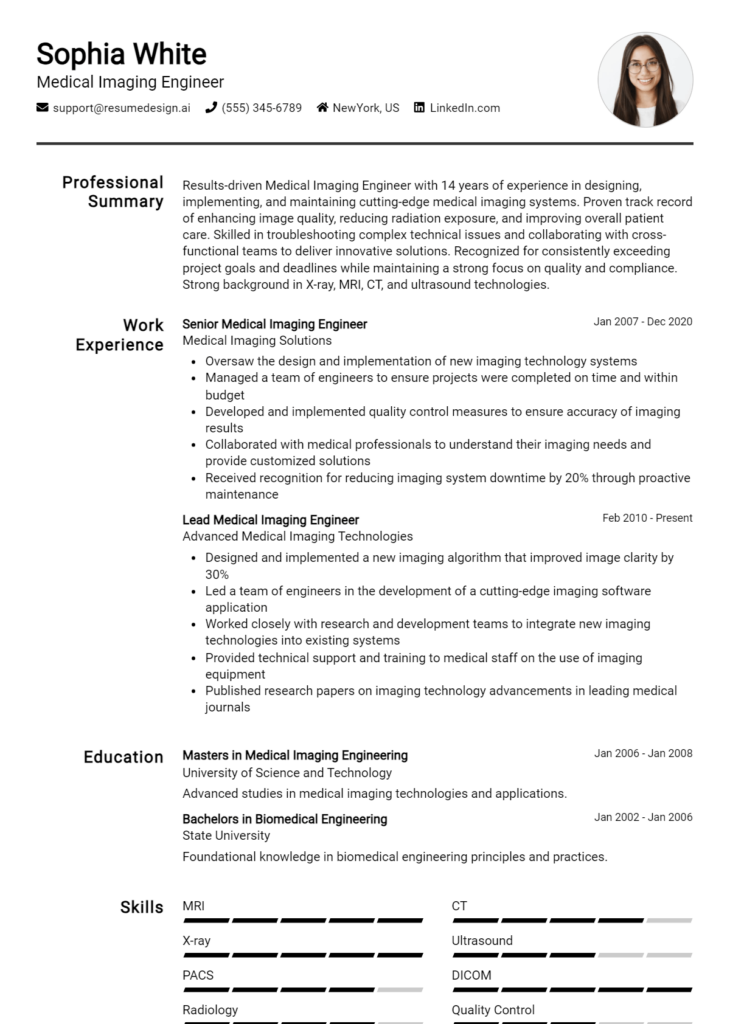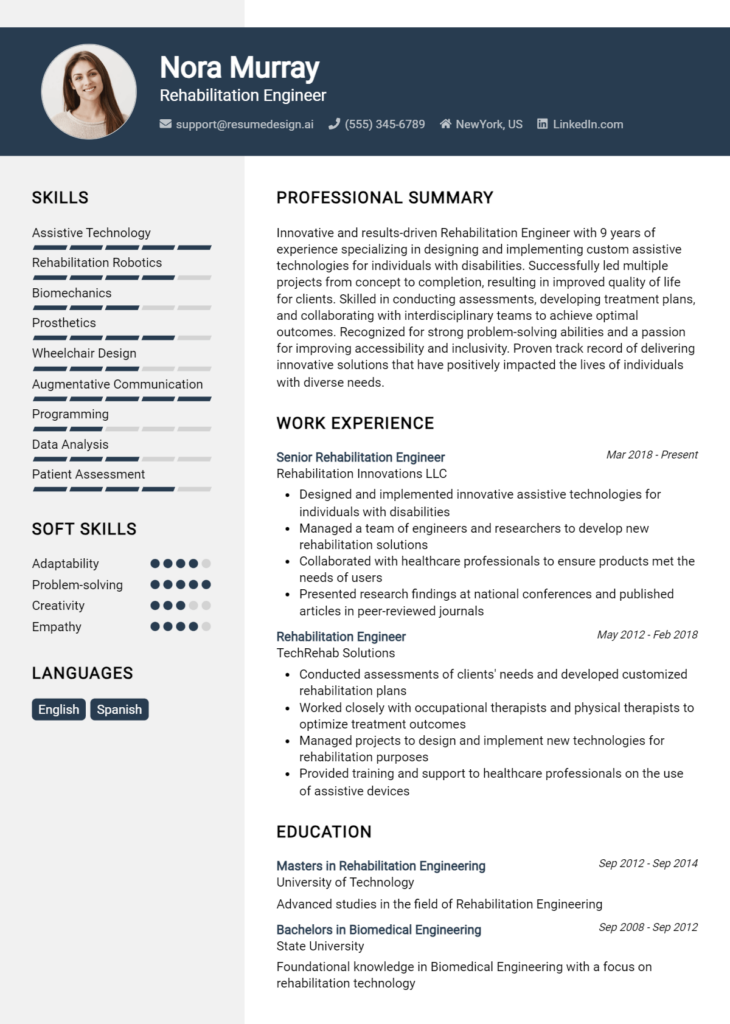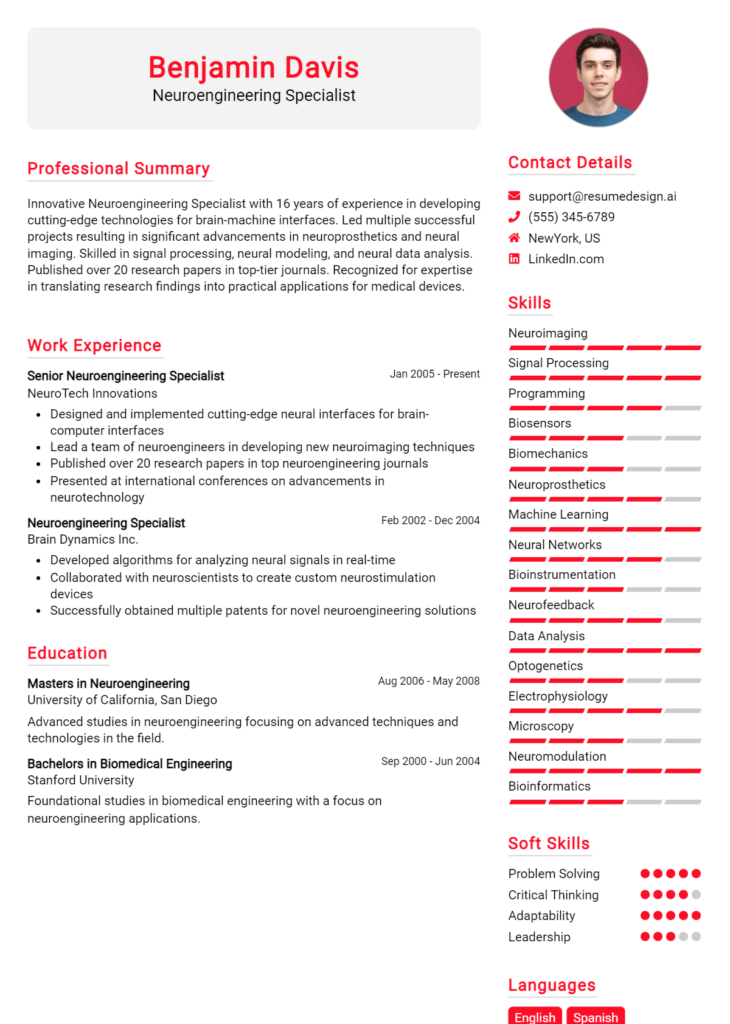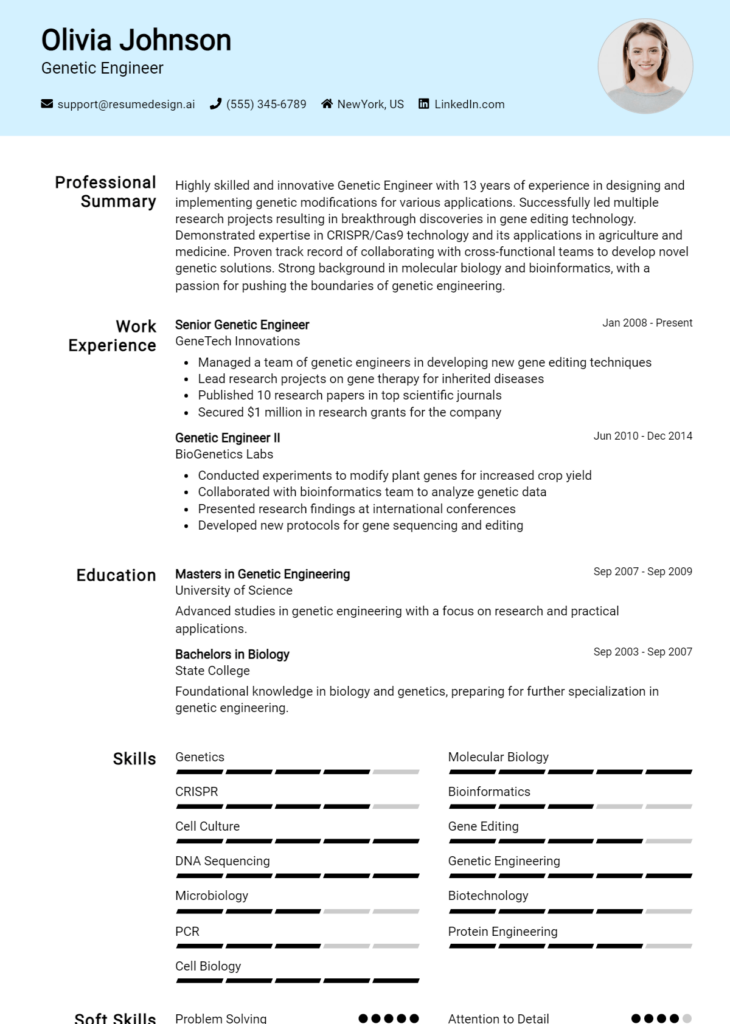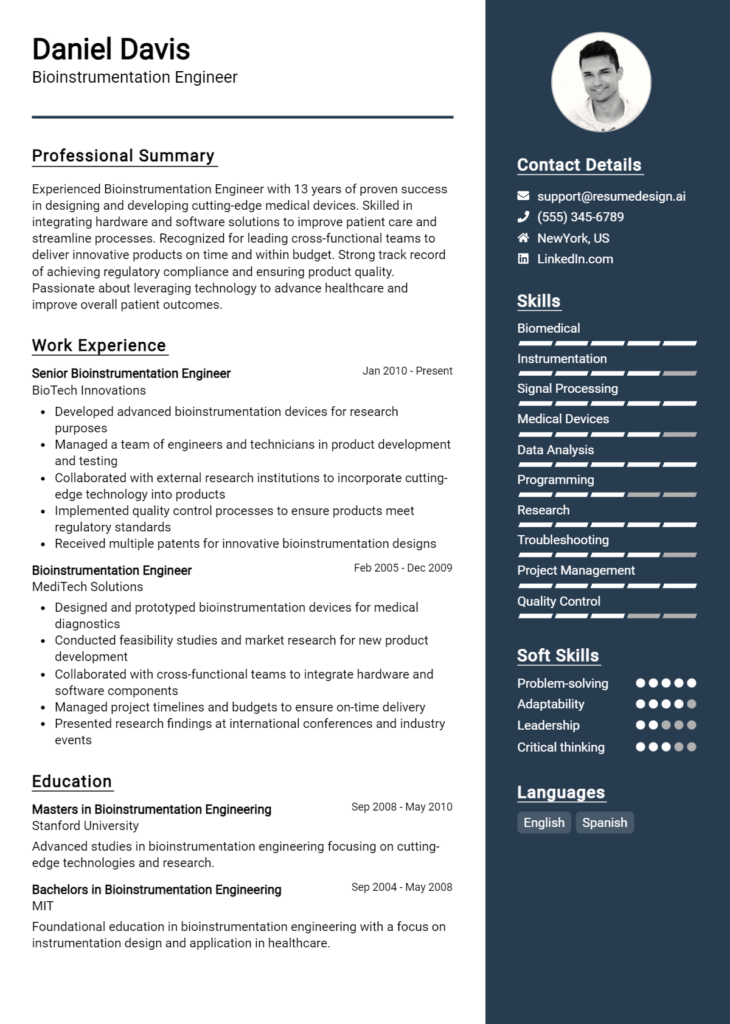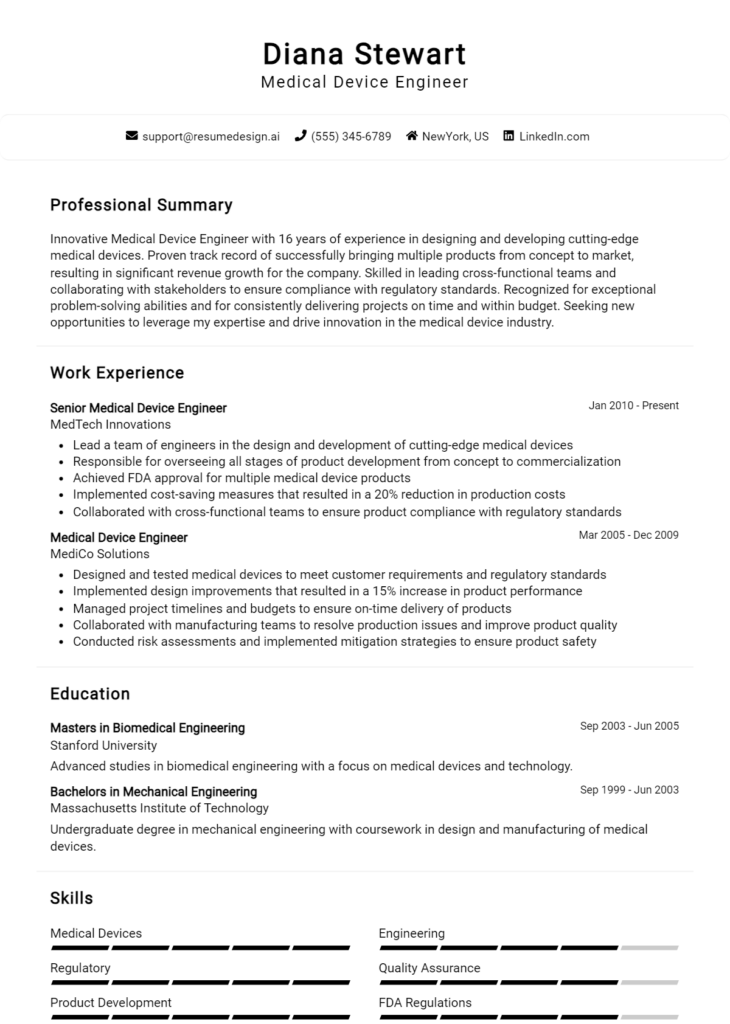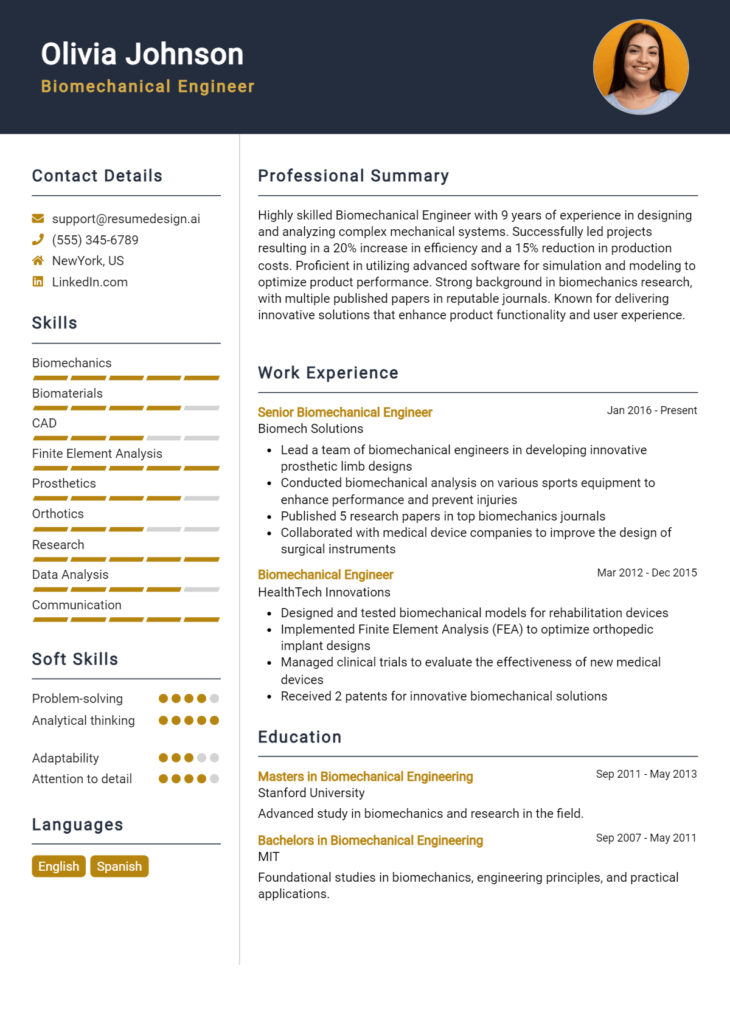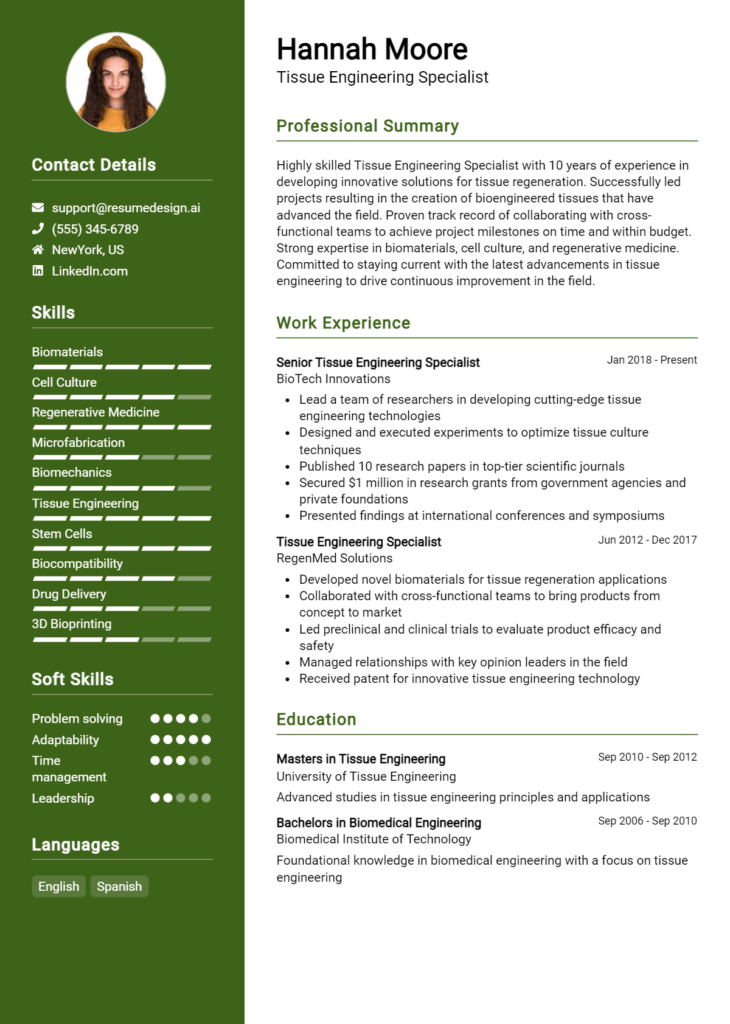Biotechnology Engineer Core Responsibilities
A Biotechnology Engineer plays a pivotal role in advancing biological systems and processes, requiring a blend of technical, operational, and problem-solving skills. These professionals collaborate across departments, from research and development to quality assurance, ensuring that innovative solutions meet organizational goals. Their expertise in genetic engineering, bioprocessing, and regulatory compliance is crucial for successful project outcomes. A well-structured resume highlighting these qualifications can effectively demonstrate their capacity to drive progress within the organization.
Common Responsibilities Listed on Biotechnology Engineer Resume
- Design and develop biotechnological processes and products.
- Conduct experiments and analyze data to improve processes.
- Collaborate with cross-functional teams on project development.
- Ensure compliance with regulatory standards and safety protocols.
- Optimize production processes for efficiency and yield.
- Document research findings and prepare technical reports.
- Perform troubleshooting and problem-solving for equipment issues.
- Stay updated on industry trends and advancements in biotechnology.
- Assist in the training and supervision of junior staff.
- Manage project timelines and budgets effectively.
- Participate in the development of intellectual property strategies.
- Provide technical support for marketing and sales teams.
High-Level Resume Tips for Biotechnology Engineer Professionals
In the competitive field of biotechnology, a well-crafted resume is crucial for professionals aiming to make a strong impact on potential employers. Your resume often serves as the first impression you make, offering a snapshot of your qualifications, experiences, and achievements. It is essential that it not only highlights your technical skills but also showcases your accomplishments in a way that resonates with the specific needs of the biotechnology industry. This guide will provide practical and actionable resume tips tailored specifically for Biotechnology Engineer professionals, helping you to create a compelling narrative that stands out in a crowded job market.
Top Resume Tips for Biotechnology Engineer Professionals
- Tailor your resume to match the job description, ensuring that you highlight the skills and experiences most relevant to the position.
- Begin with a strong summary statement that encapsulates your professional background and key competencies in biotechnology.
- Showcase relevant experience by detailing your roles in previous positions, including specific projects, techniques used, and outcomes achieved.
- Quantify your achievements wherever possible, using metrics to demonstrate the impact of your work, such as increased efficiency or successful project completions.
- Highlight industry-specific skills, such as knowledge of regulatory compliance, laboratory techniques, and bioinformatics tools.
- Include relevant certifications or licenses that enhance your credibility in the field of biotechnology.
- Utilize action verbs to convey your contributions, making your experience dynamic and engaging to potential employers.
- Keep your resume concise and focused, ideally limiting it to one page, especially if you have fewer than 10 years of experience.
- Incorporate keywords from the job listing to improve your chances of passing through Applicant Tracking Systems (ATS).
- Proofread meticulously to avoid any errors, as attention to detail is paramount in the biotechnology industry.
By implementing these tips, you can significantly enhance the effectiveness of your resume, increasing your chances of landing a job in the Biotechnology Engineer field. A well-structured and targeted resume not only showcases your qualifications but also demonstrates your commitment to your professional development, setting you apart as a standout candidate in this innovative sector.
Why Resume Headlines & Titles are Important for Biotechnology Engineer
In the competitive field of biotechnology engineering, a well-crafted resume headline or title serves as a vital first impression for job applicants. It acts as a concise summary of a candidate's key qualifications and areas of expertise, grabbing the attention of hiring managers who often sift through numerous resumes. A strong headline not only highlights relevant skills and accomplishments but also sets the tone for the rest of the resume. By being direct, relevant, and impactful, a powerful title can effectively communicate the candidate's value proposition and increase their chances of being noticed in a crowded job market.
Best Practices for Crafting Resume Headlines for Biotechnology Engineer
- Keep it concise and to the point, ideally under 10 words.
- Make it role-specific by including the job title you are applying for.
- Highlight your most relevant skills or experiences.
- Use action-oriented language that conveys your capabilities.
- Incorporate key industry terms or jargon that align with the job description.
- Avoid generic phrases and focus on unique attributes that set you apart.
- Tailor each headline to the specific job you are applying for.
- Consider adding quantifiable achievements to give weight to your title.
Example Resume Headlines for Biotechnology Engineer
Strong Resume Headlines
Innovative Biotechnology Engineer with 5+ Years in Drug Development
Results-Driven Biotech Professional Specializing in Genetic Engineering
Experienced Biotechnology Engineer Focused on Sustainable Solutions
Data-Driven Biotechnologist with Proven Track Record in Research
Weak Resume Headlines
Biotechnology Engineer Seeking Job
Professional with Experience in Biotechnology
Strong headlines are effective because they are specific and directly related to the job role, immediately conveying the candidate's qualifications and strengths. They utilize impactful language and often include quantifiable achievements, making them memorable and engaging. In contrast, weak headlines fail to impress due to their vagueness and lack of relevance. Generic phrases do not provide any insight into the candidate's capabilities and do not resonate with hiring managers, making them less likely to be noticed in a competitive job market.
Writing an Exceptional Biotechnology Engineer Resume Summary
A well-crafted resume summary is essential for a Biotechnology Engineer as it serves as a powerful introduction to your qualifications and capabilities. In a competitive job market, hiring managers often skim through numerous applications, making it crucial for your summary to quickly capture their attention. A strong summary effectively highlights your key skills, relevant experience, and notable accomplishments in a concise and impactful manner. Tailoring this section to the specific job you are applying for further enhances its effectiveness, allowing you to demonstrate your fit for the role at a glance.
Best Practices for Writing a Biotechnology Engineer Resume Summary
- Quantify Achievements: Use numbers and metrics to showcase your accomplishments and the impact of your work.
- Focus on Relevant Skills: Highlight the skills most pertinent to the biotechnology field, such as laboratory techniques, regulatory compliance, or project management.
- Tailor for the Job Description: Customize your summary to align with the job you are applying for, incorporating keywords from the job listing.
- Keep it Concise: Aim for 3-5 sentences that provide a snapshot of your qualifications without overwhelming the reader.
- Showcase Unique Qualities: Emphasize what sets you apart from other candidates, such as specialized training or unique projects.
- Use Action Verbs: Start sentences with strong action verbs to convey confidence and proactivity.
- Maintain Professional Tone: Ensure the language remains professional and reflects the seriousness of the biotechnology field.
- Avoid Jargon: While technical terms are often necessary, avoid excessive jargon that may alienate non-specialist readers.
Example Biotechnology Engineer Resume Summaries
Strong Resume Summaries
Results-oriented Biotechnology Engineer with over 5 years of experience in developing innovative biopharmaceutical products, achieving a 30% reduction in production costs through process optimization. Proficient in molecular biology techniques and quality assurance protocols, with a proven track record of leading cross-functional teams to success.
Dedicated Biotechnology Engineer with expertise in genetic engineering and a strong background in regulatory compliance. Successfully led a project that resulted in FDA approval for a new therapeutic agent, enhancing patient outcomes and generating $2 million in revenue within the first year of launch.
Analytical Biotechnology Engineer with a Ph.D. in Biochemistry and 7 years of experience in research and development. Recognized for developing a novel protein expression system that increased yield by 40%, significantly improving laboratory throughput and research timelines.
Weak Resume Summaries
Biotechnology Engineer looking for a challenging position. I have some experience in the field and am eager to learn more.
Motivated engineer with a background in biotechnology. I enjoy working on projects and am interested in various aspects of the field.
The strong resume summaries stand out due to their specificity and quantifiable achievements, clearly demonstrating the candidates' relevant skills and the direct impact of their work. In contrast, the weak summaries lack detail and measurable outcomes, making them less compelling and failing to convey the candidates' true value to potential employers. By following the best practices outlined and analyzing these examples, candidates can enhance their resume summaries to better capture the attention of hiring managers.
Work Experience Section for Biotechnology Engineer Resume
The work experience section of a Biotechnology Engineer resume is crucial as it serves as a testament to the candidate's technical skills, project management capabilities, and proficiency in delivering high-quality products. This section not only provides insight into the candidate's hands-on experience with biotechnological processes and equipment but also emphasizes their ability to collaborate effectively within multidisciplinary teams. Quantifying achievements—such as increased efficiency, project scope, or revenue—is vital in demonstrating the impact of their contributions. Additionally, aligning work experience with industry standards ensures that the candidate showcases their relevance in the rapidly evolving biotechnology field.
Best Practices for Biotechnology Engineer Work Experience
- Highlight relevant technical skills specific to biotechnology, such as proficiency in laboratory techniques and data analysis.
- Quantify achievements with metrics, such as project completion rates, budget management, or improvements in product yields.
- Emphasize collaboration by detailing experiences working in cross-functional teams or leading projects.
- Include specific technologies, methodologies, or software used in past roles to demonstrate expertise.
- Tailor your experience descriptions to align with the requirements of the job you're applying for.
- Use action verbs to convey your role and contributions effectively.
- Detail any leadership roles or initiatives taken that showcase your ability to manage projects or teams.
- Keep descriptions concise while providing enough detail to convey the significance of your contributions.
Example Work Experiences for Biotechnology Engineer
Strong Experiences
- Led a team of 5 engineers in a project that developed a new biopharmaceutical, resulting in a 30% increase in production efficiency.
- Implemented a quality control protocol that reduced product defects by 25%, enhancing overall product reliability and customer satisfaction.
- Collaborated with cross-disciplinary teams to design a novel gene editing technique, which reduced processing time by 40% in clinical trials.
- Managed a $2 million budget for a microbiome research project, delivering results under budget and ahead of schedule.
Weak Experiences
- Worked on various projects in the lab.
- Assisted in some experiments related to biotechnology.
- Participated in team meetings and discussions.
- Helped with paperwork and documentation.
The examples presented illustrate the difference between strong and weak experiences. Strong experiences are characterized by specific, quantifiable outcomes that demonstrate technical leadership, collaboration, and effective project management. They provide clear evidence of the candidate's contributions to the field of biotechnology. In contrast, weak experiences lack detail and fail to convey the candidate's impact or the skills they utilized, making them less persuasive to potential employers.
Education and Certifications Section for Biotechnology Engineer Resume
The education and certifications section of a Biotechnology Engineer resume plays a critical role in establishing the candidate's academic qualifications and professional credibility. This section not only showcases the educational background relevant to biotechnology but also highlights any industry-recognized certifications and specialized training that demonstrate the candidate's commitment to continuous learning. By including relevant coursework and advanced certifications, candidates can significantly enhance their appeal to potential employers, showcasing their preparedness to meet the demands of the biotechnology field.
Best Practices for Biotechnology Engineer Education and Certifications
- List degrees in reverse chronological order, starting with the most recent.
- Include relevant coursework that aligns with job requirements to demonstrate specialized knowledge.
- Highlight industry-recognized certifications that showcase your expertise and commitment to the field.
- Use clear and concise language to make the section easy to read and understand.
- Be specific about the skills gained from certifications or training, linking them to job responsibilities.
- Consider including honors or awards received during your education that demonstrate excellence.
- Update this section regularly to reflect new certifications or educational achievements.
- Tailor your educational details to match the job description, emphasizing the most relevant qualifications.
Example Education and Certifications for Biotechnology Engineer
Strong Examples
- M.S. in Biotechnology, Stanford University, 2022
- Certified Biotechnologist (CBT), Biotech Certification Board, 2023
- Relevant Coursework: Genetic Engineering, Bioprocessing, and Bioinformatics
- B.S. in Molecular Biology, University of California, 2020
Weak Examples
- B.A. in History, State University, 2015
- Certification in Microsoft Office, Online Training Institute, 2020
- High School Diploma, Local High School, 2014
- Certification in Basic First Aid, Red Cross, 2019
The strong examples provided are considered effective as they directly relate to the biotechnology field, showcasing advanced degrees and certifications that enhance the candidate's qualifications. In contrast, the weak examples include irrelevant educational backgrounds and certifications that do not pertain to the biotechnology sector, thereby diminishing the candidate's credibility and potential fit for the role.
Top Skills & Keywords for Biotechnology Engineer Resume
In the rapidly evolving field of biotechnology, having the right skills is essential for engineers to excel in their roles and make significant contributions to scientific advancements. A well-crafted resume that highlights both hard and soft skills can set candidates apart from the competition. Employers look for a combination of technical expertise and interpersonal abilities, ensuring that candidates can not only perform specific tasks but also collaborate effectively within multidisciplinary teams. This blend of skills reflects a comprehensive understanding of the field and its demands, making it crucial for biotechnology engineers to showcase their capabilities in a balanced manner. For more insights on how to effectively present skills and work experience, consider exploring these resources.
Top Hard & Soft Skills for Biotechnology Engineer
Hard Skills
- Molecular Biology Techniques
- Genetic Engineering
- Bioprocessing and Fermentation
- Bioinformatics
- Quality Control and Assurance
- Laboratory Techniques (e.g., PCR, Gel Electrophoresis)
- Regulatory Compliance (FDA, EMA)
- Data Analysis and Statistical Software
- Cell Culture Techniques
- Enzyme Engineering
- Biotechnology Product Development
- Immunology
- Analytical Chemistry
- Biochemical Engineering
- Process Optimization
- Microbiology
- Project Management Tools
- Computational Modeling
Soft Skills
- Problem-Solving Abilities
- Strong Communication Skills
- Team Collaboration
- Critical Thinking
- Attention to Detail
- Time Management
- Adaptability and Flexibility
- Leadership and Mentorship
- Creativity and Innovation
- Conflict Resolution
- Interpersonal Skills
- Organizational Skills
- Initiative and Proactivity
- Emotional Intelligence
- Ethical Judgment
- Networking and Relationship Building
- Resilience
- Continuous Learning Orientation
Stand Out with a Winning Biotechnology Engineer Cover Letter
Dear [Hiring Manager's Name],
I am writing to express my interest in the Biotechnology Engineer position at [Company Name] as advertised on [where you found the job listing]. With a solid educational background in biotechnology and extensive hands-on experience in laboratory settings, I am excited about the opportunity to contribute to your team and help advance innovative solutions in the biotechnology field. My passion for biosciences, coupled with my technical skills in molecular biology and genetic engineering, positions me uniquely to make a significant impact at [Company Name].
During my time at [Previous Company/University], I successfully led several projects involving the development of bioprocesses for the production of recombinant proteins. My role required not only technical expertise in fermentation and purification techniques but also a strong ability to collaborate with cross-functional teams to ensure project milestones were met on time. I am adept at utilizing advanced analytical methods to troubleshoot and optimize processes, resulting in a 20% increase in yield efficiency in my last project. I am particularly drawn to [Company Name] because of your commitment to sustainable practices and innovative research, and I am eager to bring my skills in data analysis and process optimization to further enhance your product development initiatives.
In addition to my technical qualifications, I bring strong communication skills that allow me to effectively convey complex concepts to both technical and non-technical stakeholders. I believe that collaboration and effective communication are key to driving successful outcomes in any project. I am excited about the prospect of working in an environment that values teamwork and creativity, and I am confident that my proactive approach and problem-solving abilities will make me a valuable addition to your team.
Thank you for considering my application. I look forward to the opportunity to discuss how my background and skills align with the goals of [Company Name]. I am eager to contribute to your mission and help drive advancements in biotechnology. Please feel free to contact me at [Your Phone Number] or [Your Email] to arrange a conversation.
Sincerely,
[Your Name]
Common Mistakes to Avoid in a Biotechnology Engineer Resume
When crafting a resume for a Biotechnology Engineer position, it's essential to present your skills and experiences effectively to stand out to potential employers. However, many candidates make common mistakes that can detract from their qualifications. Understanding these pitfalls can help you create a more compelling resume that accurately reflects your expertise and aligns with industry expectations.
Lack of Specificity: Failing to provide specific details about your experiences can make your resume vague. Instead of saying "worked on projects," specify which projects and your role in them.
Ignoring Keywords: Many companies use Applicant Tracking Systems (ATS) to filter resumes. Not including relevant keywords from the job description can lead to your resume being overlooked.
Overloading with Technical Jargon: While it's important to demonstrate your technical skills, using too much jargon can alienate hiring managers who may not be familiar with specific terms. Aim for clarity and balance.
Unorganized Layout: A cluttered resume can make it difficult for hiring managers to find key information. Use clear headings, bullet points, and consistent formatting to enhance readability.
Neglecting Soft Skills: Biotechnology engineers often work in teams and need strong communication skills. Focusing solely on technical abilities may overlook important soft skills that employers value.
Using an Unprofessional Email Address: An unprofessional email can create a negative first impression. Always use a simple, professional email address that includes your name.
Failing to Tailor the Resume: Sending out a generic resume for multiple applications can hurt your chances. Tailor your resume to highlight the most relevant experiences and skills for each specific job.
Omitting Achievements: Simply listing job duties rather than accomplishments can diminish the impact of your resume. Quantify your achievements with metrics when possible to showcase your contributions.
Conclusion
As we have explored the dynamic and multifaceted role of a Biotechnology Engineer, it is clear that this profession not only demands a solid foundation in biological sciences but also requires a blend of engineering principles and innovative thinking. Biotechnology Engineers play a pivotal role in the advancement of healthcare, agriculture, and environmental solutions through the application of biotechnological methods. Key responsibilities include developing bioprocesses, conducting research to improve product efficacy, and collaborating with interdisciplinary teams to bring groundbreaking solutions to market.
In today’s competitive job market, having a polished and professional resume is essential for standing out. As you reflect on your own qualifications and experiences in the field of biotechnology, take a moment to review your Biotechnology Engineer resume. Ensure that it highlights your technical skills, project experiences, and contributions to innovative projects.
To assist you in this endeavor, consider utilizing various resources available to enhance your resume. You can access a range of resume templates to find a design that suits your professional style. If you prefer a more guided approach, try out the resume builder to create a tailored resume efficiently. For inspiration, browse through resume examples that showcase successful Biotechnology Engineers. Additionally, don't overlook the importance of a compelling cover letter; explore our collection of cover letter templates to craft a strong introduction to your application.
Embrace the opportunity to refine your resume and position yourself as a leading candidate in the field of biotechnology. Take action today!

